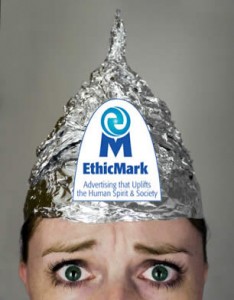AdAge Challenges the Tinfoil Hats
 Rance Crain, Editor-in-Chief of Advertising Age (as well as Crain’s Chicago Business, Crain’s New York Business, and TelevisionWeek) has taken the neuro-alarmists to task in a sensible AdAge piece, Neuromarketing Threat Seems Quaint in Today’s Ad Landscape.
Rance Crain, Editor-in-Chief of Advertising Age (as well as Crain’s Chicago Business, Crain’s New York Business, and TelevisionWeek) has taken the neuro-alarmists to task in a sensible AdAge piece, Neuromarketing Threat Seems Quaint in Today’s Ad Landscape.
Crain describes the EthicMark ad competition and the group’s fears about neuromarketing. The EthicMark awards don’t recognize brilliant creativity or stellar sales results, but rather admit only advertisers who don’t use “subliminal messages, brain science, MRIs or endocrinology as tools to manipulate [consumers] for marketing purposes.”
I’ve used “better marketing through brain science” as a personal tagline for years, and I had no idea these people were my sworn enemy.
That’s right – the folks at EthicMark would apparently prefer that marketers ignore how consumers really think and process information, presumably so that ads can be less engaging and ultimately less effective. All ads are intended to change behavior in some way, and for some people that’s “manipulation.”
Oddly, one of EthicMark’s sponsors is the Mendoza College of Business at Notre Dame. That excellent B-school does emphasize ethics, which more MBA programs should do – but did they read the fine print that pillories any brain science-based marketing? Should we go back to good, old-fashioned guesswork?
Nike is a past EthicMark award winner – a strange choice, since the firm is arguably one of the most effective purveyors of ads that hit consumers at a visceral, emotional level. When was the last time you saw a Nike commercial that focused on features & benefits?
Crain points out that the concept that neuromarketing techniques could turn consumers into mindless drones is greatly overblown:
Does advertising have the power to infuse consumers with a buying frenzy that will destroy the planet? I have always thought advertising’s critics give it entirely too much credit for getting consumers to act like automatons.
This paraphrases what I’ve said for years both here and in every speech I give… If it were possible to create such incredibly powerful ads, they would have been created long before brain scans existed. We’ve had decades of brilliant and creative ad people who have tested millions of ads. By luck or design, these supposed “super-ads” would have been discovered years ago – without neuroscience!
What neuromarketing techniques can do, in my opinion, is help eliminate ads that are boring, annoying, ineffective, and ultimately a waste of both advertiser money and consumer time.
Crain is right about a more tangible threat to focus on: the relentless collection of behavioral and other data by all kinds of marketers. He closes with the amusing (or perhaps disturbing) note,
If the neuromarketing guys could get together with the big data guys, maybe they could figure out a way to incorporate below-the-surface fantasies with the tracking of rational buying behavior as the new evil of our times, and EthicMark would be the hottest ticket in town.
Indeed.
[Disclaimer: (1) We like the folks at AdAge. They list Neuromarketing as #32 on their AdAge Power 150 list of 1,119 advertising and marketing blogs.(2) This post is opinion, including the illustration. We don’t really know if the EthicMark people wear tinfoil hats.]
